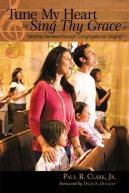 I had the wonderful privilege last week to teach at “Church Music Georgia,” our southern neighbors’ rendition of our statewide Tennessee Music Ministry Leadership Conference. I was teaching my final session on Worship Renewal through Congregational Singing when a knock came at our classroom door and a familiar lady stepped in and motioned for one of our participants to leave the class. The gentleman being called out was a longtime friend, member of a former church that I served, and currently minister of music in a small Georgia town. There was an urgency in her broken voice as she instructed him to bring all of his things. He gathered music and satchel and left the classroom with a sense of abandon.
I had the wonderful privilege last week to teach at “Church Music Georgia,” our southern neighbors’ rendition of our statewide Tennessee Music Ministry Leadership Conference. I was teaching my final session on Worship Renewal through Congregational Singing when a knock came at our classroom door and a familiar lady stepped in and motioned for one of our participants to leave the class. The gentleman being called out was a longtime friend, member of a former church that I served, and currently minister of music in a small Georgia town. There was an urgency in her broken voice as she instructed him to bring all of his things. He gathered music and satchel and left the classroom with a sense of abandon.
After a momentary awkward pause another former church member who was attending the class said, “that did not look good.” I was reminded that the familiar lady who had come was his wife, and another class member noted that she had tears in her eyes. Left to wonder, we could only imagine what might have taken place. I felt an urge to call the class to prayer, which I did and we lifted up the family of this friend, all of whom I knew and cared about. I voiced the prayer that primarily asked for God who knows all to intervene, be with them and meet their need.
Such a dramatic shift in the class environment was not easy to overcome. We had begun the morning session singing a few familiar hymns and had addressed their potency to express our praise to God, our witness about God, and our ministry and admonition to one another. Before being called out, my friend had expressed his affirmation of this singing with a characteristic motion of a clinched fist and a lightly voiced, “Amen!” I had been speaking about the biblical reminders to sing to one another in our gatherings as a way to admonish each other with “psalms, hymns, and spiritual songs.” (Col 3:16) We sang the refrain of “Have Faith in God,” as an example of a hymn that believers sing to encourage and strengthen one another. I don’t think I’ll ever forget that morning, given the sudden developments and what I know now about what had taken place in his life that he had no idea about at the moment we were singing those encouraging words,
“Have faith in God, He’s on His throne,
Have faith in God, He watches o’er His own
He cannot fail, He must prevail! (pumping the clinched fist)
Have faith in God! Have faith in God!
It was not until late that afternoon that I found out that my friend’s father had taken his own life. His sweet, gentle mother had found her husband at home, dead from a self-inflicted gunshot wound. My heart goes out to this close-knit Christian family who must have insurmountable questions about such a tragic event. The father was a deacon, a former Sunday School teacher, and faithful choir member who was very open with his expression of love for his large family.
The son who had been in our class testified that after he received the tragic news in the church hallway outside our classroom, he drove to be with his mother and on the drive received “such peace.” In the face of this tragedy it seems the Lord answered our prayer for his comfort, and used the echoing admonition that had been sung just moments before to have faith in God.
Every Sunday your church body has opportunity to sing ministry into the hearts and lives of those gathered for worship. It is so important to make deposits in the repository of the minds and memories of those gathered. You never know when a phone call or knock at the door may accompany tragic news such that a worshiper will rely upon the admonition and encouragement received as the church sang its song of faith, witness, admonition, worship, and/or praise.
Sing, congregation, sing!
Paul




